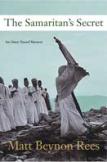Murder, Money, Mayhem
Days of pleasure are rare for Omar Yussef. The 57-year-old Palestinian school teacher turned detective is in the West Bank town of Nablus to attend a wedding, when he quickly finds himself investigating two crimes-the theft of the Abisha Scroll, the oldest and most revered text of the Samaritan sect, and the murder of Ishaq, a young homosexual Samaritan who had served as financial advisor to the late Yasser Arafat and had access to the "Old Man's&rdquo illicit accounts.
It is a race against time for the endearingly cranky Omar Yussef, who must solve the murder and locate Arafat's foreign stash before the World Bank cuts off funding for the Palestinian Territories. Was Ishaq killed because of his sexual preference or for his knowledge of Arafat's millions? Or was he the "collateral damage&rdquo of a power struggle between Hamas and Fatah?
Motives overlap in The Samaritan's Secret, a multi-layered mystery by Matt Beynon Rees. The former Jerusalem bureau chief for Time left reporting to write award-winning crime novels that feature fiction's only Palestinian detective. In this, his third book, Rees masterfully concocts another claustrophobic tale from the occupied territories that takes us deep into the Palestinian experience even as it entertains.
Two-thousand-year-old Nablus is a town saturated in history and secrets. Built atop the Roman city of Neapolis, which supplanted the ancient Jewish city of Shekem, Nablus was once the hub of Palestinian commerce and poetry. Today, the town suffocates under a fearsome insularity. "It's only faith in Allah that allows you to believe that your soul might escape this town, even when you die,&rdquo says Nouri Awwadi, a Hamas militant and native of Nablus.
Omar Yussef's search for Ishaq's killer takes him through the shadowy streets of Nablus's covered casbah and into the crumbling Toaqan Palace, now a slum. From the edge of a public square littered with "posters advertising the latest martyr,&rdquo he watches as the stern Sheikh Bader presides over a Hamas-sponsored wedding of 15 couples. Among the grooms is the ruddy-faced Islamist Awwadi. Like Ishaq, he prefers men to women, and seeks his pleasure in the mildewed steam rooms of the town's Turkish baths.
Love and desire are no less complicated in the mansions of the elite or in the Samaritan homes scattered along the ridge of Nablus's Mount Jerizim. Descendants of the ancient Israelites, the Samaritans believe Mount Jerizim is where God asked Abraham to sacrifice his son Isaac. For thousands of years, they have lived within view of the mountain, remaining even during the Babylonian exile. The Torah is their text and the nearly 4,000-year-old Abisha Scroll their bridge to the Messiah. "Without this scroll, our Messiah can never return to us,&rdquo says the fiercely protective Samaritan priest Jabril Ben-Tabia.
But the Samaritans of Nablus are a jeopardized tribe. Their community, which has dwindled to 600 people, lives in isolation on holy Jerizim's ridge, where their deformed children bear "the unmistakable signs of in-breeding.&rdquo
Omar Yussef moves in and out of Nablus's distinct and colliding worlds. Subplots abound, and there are as many red herrings in The Samaritan's Secret as there are dead-end alleyways in the town's casbah. The Palestinian investigator is a Muslim humanist, a man of heroic integrity and obvious vulnerabilities. He is irritated by narrow-mindedness and his aging knees. He fights self-doubt. Doggedly persistent in eliciting confessions, he weeps over what is revealed.
Omar Yussef's sidekick, Khamis Zeydan, who has aided the school-teacher in the past, features prominently in this tale and provides much of its emotional tension. The alcoholic police chief of Bethlehem is a haunted man, living a paradox. Formerly the P.L.O.'s top assassin, he now enforces the law for a still stateless people. His struggle to shed the past is complicated by the fact that his former lover is now married and lives in one of Nablus's mansions. Although Zeydan swings between cynicism and gritty hope, his commitment to his truth-seeking friend remains constant.
The banter between the two men yields some of the most humorous and poignant passages in the book. When the hardened police chief reminds the empathetic detective that understanding the "inhumanity of the murderer&rdquo requires cold detachment, Omar Yussef replies: "You're forgetting that passion and love might enter it. I prefer to enter the head of the killer by feeling those emotions rather than by hate and violence.&rdquo
Fiction has become Rees's means for "entering the heads&rdquo of the Palestinians. In his desire to know what he calls "the most emotionally real elements&rdquo of a place, he gives us Palestine's important stories. As with the previous books in this series, the Israeli occupation remains the unexamined variable. In other reviews, I have criticized Rees for this omission. Conflict breeds lawlessness and to tell a tale of Palestinian criminality apart from the larger context of Israel's incursion seems incomplete. But perhaps because I read this book while the conflict in Gaza raged, I found myself grateful for the opportunity to consider Palestinians in their own light, apart from the stereotype of victim or terrorist. The people in Omar Yussef's world know familial love and disappointment. They live with regret, fight despair, cherish happiness and, against great odds, try to do the right thing.
"My novels focus on those individuals who are prepared to stand up and take risks&ampampmdashalbeit small by our standards but enormous by theirs,&rdquo said Rees during an interview on National Public Radio last summer. "It's not that at the end some grandiose peace is achieved. The scale is much smaller, more like episodes in the larger scheme of things, which get resolved.&rdquo
Amid all the tales of destruction recently emanating from the Palestinian Territories, I welcomed contemplating Rees's episodic peace.
This article also appeared in print, under the headline “Murder, Money, Mayhem,” in the May 25, 2009, issue.








